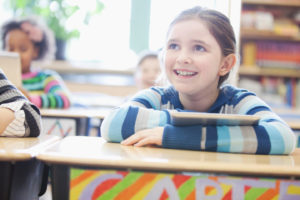Public summer learning loss program for middle schoolers hosted by Missouri private school
(The Sentinel) – An innovative new program based out of Thomas Jefferson Independent Day School in Joplin, Missouri, is hoping to make a difference in student achievement with a four-week summer…

(The Sentinel) – An innovative new program based out of Thomas Jefferson Independent Day School in Joplin, Missouri, is hoping to make a difference in student achievement with a four-week summer school program focused on core academics as well as personal development.
Called “Compass Academy,” the program runs four weeks in July and is a full school day for sixth through eighth grade students. Compass is based at Thomas Jefferson but the program is completely independent of the school.
According to the Compass Academy Network website, the free program “focuses on summer enrichment because of the summer slide. Summer learning loss, also known as the ‘Summer Slide,’ is a well-documented phenomenon that education researchers have studied for over 100 years. ‘Summer Slide’ describes the common experience of students losing some of what they learned the previous year because they are not academically engaged or challenged during the summer.”
Indeed, students from third to eighth grade typically lose 25-30% of the gains made in math during the previous school year, and 15-25% of the gains in reading during the summer.
Thomas Jefferson Head of School Laura McDonald is also Director of Program Development for the Compass Academy and said they call it a “network” because the goal is to spread the program to partner schools across the region.
“We started in 2019,” she said. “And the reason it’s called Compass Academy Network is because the goal is to build a network of these programs across the Midwest.”
Districts that partner with CAN also are able to earn a $5,000 grant for their middle school, and students who meet attendance goals and graduate from the program earn a $45 Walmart gift card as an incentive.
McDonald said the program started out of a realization that there was a need for summer programs for middle school students.
“There’s a need in the summer for academic enrichment for middle school kids,” she said. “Often there are a lot of great programs for high school kids, especially once they get into athletics, and they do weights and things like that. In elementary school local libraries and things do all kinds of great things for elementary school kids, but really, there’s not a lot available for middle school kids in the summer, whether it’s academic or athletic.”
The Columbus, Kansas school district partnered this summer with CAN and Columbus Unified High School Principal Dan Grundy said that lack of summer programs for middle schoolers was part of their reason for joining.
“You know, obviously, we’ve all been looking for ways since we’ve had some of the breaks in COVID, and some kids, you know, just had some gaps and things that they needed, and what we can do to kind of help with those,” Grundy said. “So when they approached me and talked about summer school and talked about kids learning management skills, kids learning organizational skills and then also the fact that there’s some math, English, art … team building involved. All of those words and cliches are not bad things for kids.
“We have a summer school in high school, but that’s all geared towards making up credits that you need to have to graduate. We have summer school in elementary school, but those are geared more towards just reading skills … making sure that you’re able to go into the next grade and be close to on track.”
Grundy noted that with the month in July, students would then have a couple of weeks off and then jump right back into school — hopefully helping to arrest the “Summer Slide.”
Compass Academy ‘peer mentors’ and hands on learning make a difference
McDonald said there are several innovative features to the program, chiefly the use of “peer mentors“ — college students hired to come in and teach the subjects — and hands-on application of every subject.
“All the academic stuff has hands on projects built into it,” McDonald said. “We take some of the core subjects but we try to make them more hands-on and applicable to their lives. Kids would normally have social studies in middle school, but we teach civics instead. It talks about our government, both the local government, the United States government, how it’s structured, you know, the importance of voting and having a voice.
“I think similarly with math, try to do a lot of decision making and in budgeting and financial planning. So it’s not just … they do algebra and geometry and things like that. We try to build in different projects that will help them plan their finances when they get their first paycheck or plan for college or community college or you know, their first job out of high school. Whatever that may be.”
McDonald said the peer mentors are important because while they’re old enough to be an authority figure for the students, they’re young enough that the middle-schoolers can relate to them on a more equal footing.
Grundy agreed.
“When you’re a junior high kid, if someone looks like mom or dad, you treat them like mom or dad, right?” he said. “And so you kind of get under that threshold to where they now feel like they have a different connection, which is great. Having that peer connection made a huge difference.”
Too early to track gains
While the program started in 2019, COVID shutdowns kept CAN from gaining steam and the first year in 2020 was entirely online which posed challenges.
“I think if we had been established for 25 years we could have done the digital year and it would have been fine,” she said. “But we’re finding our footing again, we’ve been back in person for 2021 and 2022 and 2023. So we have some years under our belt.
McDonald said they are now working on what metrics they can use in partnership with districts to see how successful the program is.
While it is difficult to be sure, it is reasonable to assume that a month of academics in the summer would tend to improve overall achievement.
For Grundy and Columbus students, this was the first year and only about 26 to 28 students attended, so even anecdotal improvements will be hard to track just yet. But Grundy said there were three students off the top of his head who had had attendance problems the previous school year and so far this year had not missed a single day.
“I can think of about three names that we were having some attendance issues with, I don’t think they’ve missed a day this semester,” he said. “I can just see them in my head now, they probably struggled wanting to come to school last year, and did the summer school and now I don’t think we’ve had an issue with them coming to school.”
CAN uses Thomas Jefferson as a “host location” only. Compass reimburses TJ for the usage of school facilities) and does employ some TJ faculty along with other local area educators. Compass seeks to partner with local rural public schools such as Columbus to address summer learning loss and improve student outcomes by sending students back to their own public schools energized and ready to learn after the summer. Part of the strategy is to include civics very intentionally in the curriculum and our ultimate goal is to develop active and engaged citizen-leaders who can be successful not just in high school but in life and contribute to their communities. Not only is middle school a critical time for kids, we are also seeking to address the disparity in resources between rural and urban districts.



